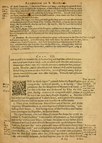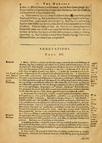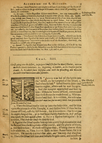John Baptist by his Eremite’s life, by his preaching and Baptism, calleth all unto penance, to prepare them to Christ. (10) He preacheth to the Pharisees and Sadducees, threatening to them (unless they truly do penance) reprobation here, and damnation hereafter; and for salvation sendeth them to Christ and his Baptism. Which being far more excellent than John’s, yet Christ himself among those penitents vouchsafeth to come unto John’s Baptism. Where he hath testimony from Heaven also.
AND in those days * cometh John the Baptist preaching in the • desert of Jewry, 2and saying: • Do penance, for the Kingdom of Heaven is at hand. 3For this is he that was spoken of by Esay the Prophet, saying: A voice of one crying in the desert, prepare ye the way of our Lord, make straight his paths. 4And the said John had his garment of Camel’s hair, and a girdle of a skin about his loins: and his meat was locusts and wild honey.
5Then went forth to him Jerusalem and all Jewry, and all the country about Jordan; 6and were baptised of him in Jordan, • confessing their sins. 7And seeing many of the Pharisees and Sadducees coming to his Baptism, he said to them:
Ye viper’s brood, who hath showed you to flee from the wrath to come? 8Yield therefore • fruit worthy of penance. 9And delight not to say within yourselves, we have Abraham to our father. For I tell you that God is able of these stones to raise up children to Abraham. 10For now the • axe is put to the root of the trees. Every tree therefore that doth [a] not yield good fruit, shall be cut down, and cast into the fire. 11I indeed baptise you • in water unto penance, but he that shall come after me, is stronger than I, whose shoes I am not worthy to bear, he shall baptise you in the Holy Ghost and fire. 12Whose fan is in his hand, and he shall clean purge his • floor; and he will gather his wheat into the barn, but the chaff he will burn with unquenchable fire.
13Then cometh Jesus from Galilee to Jordan, unto John, to be baptised of him. 14But John stayed him, saying: I ought to be baptised of thee, and comest thou to me? 15And Jesus answering, said to him: Suffer me for this time. For so it becometh us to fulfil all justice. Then he suffered him. 16And Jesus being baptised, forthwith came out of the water; and lo the Heavens were • opened to him; and he saw the Spirit of God descending as a dove, and coming upon him. 17And behold a voice from Heaven saying: This is my beloved Son, in whom I am well pleased.
Footnotes
- ^ It is not only damnable, to do ill, but also, not to do good, Aug ser. 6 de temp.
ANNOTATIONS. CHAP. III.
↑1. Desert.) Of this word desert (in Greek eremus) cometh the name Eremitages and Eremites, that live a religious and austere life in deserts and solitary places, by the example of St. John Baptist; whom the holy Doctors therefore call the Prince and as it were the author of such profession, St. Chrys. hom. 1 in Marcum and hom. de Jo. Baptista, Jero. ad Eustoch. de custod. virg. Isid. lib. 1 ch. 15 de divi off., Bernardus de excel. Jo. Baptiste. Wherewith the Protestants are so offended that they say, St. Chrysostom spoke rashly, and untruly. And no marvel, for whereas the Evangelist himself in this place maketh him a perfect pattern of penance, and Eremitical life, for desert or wilderness, for his rough and rude apparel, for abstaining from all delicate meats (according to our Saviour’s testimony also of him (Mt. 11, 8., Luc. 7, 33.) they are not ashamed to pervert all with this strange commentary, that it was a desert * full of towns and villages, his garment was * chamlet, his meat * such as the country gave, and the people there used: to make him thereby but a common man like to the rest, in his manner of life: clean against Scriptures, Fathers, and reason.
↑2. Do penance.) So is the Latin, word for word, so readeth all antiquity, namely St. Cyprian ep. 52. often, and St. Augustin lib. 13 Confes. ch. 12 and it is a very usual speech in the New Testament, specially in the preaching of St. John Baptist, * Christ himself, and * the Apostles; to signify perfect repentance, which hath not only confession and amendment, but contrition, or sorrow for the offence, and painful satisfaction: such as St. Cyprian speaketh of in all the foresaid epistle. But the Adversaries of purpose (as * namely Beza protesteth) mislike that interpretation, because it favoureth Satisfaction for sin, which they cannot abide. Where if they pretend the ∷ Greek word, we send them to these places Mat. 11, 21., Luc. 10, 13., 2 Cor. 7, 9. Where it must needs signify, sorrowful, painful, and satisfactory repentance. We tell them also that * St. Basil a Greek Doctor calleth the Ninivite’s repentance with fasting, and haircloth, and ashes, by the same Greek word μετανοιαν. And more we will tell them in other places.
↑6. Confessing their sins.) John did prepare the way to Christ and his Sacraments, not only by his Baptism, but by inducing the people to Confession of their sins. Which is not to acknowledge themselves in general to be sinners, but also to utter every man his sins.
↑8. Fruit worthy.) He preacheth Satisfaction by doing worthy fruits or works of penance, which are (as St. Jerom says in 2 Joel) fasting, praying, alms, and the like.
↑10. The axe.) Here Preachers are taught to dehort from doing evil for fear of Hell, and to exhort to do good in hope of Heaven: which kind of preaching our Adversaries do condemn.
↑11. In water.) John’s Baptism did not remit sins, nor was comparable to Christ’s Baptism, as here it is plain, and in many other places, Jero. adv. Lucifer, Aug. de Bap. cont. Donat. lib. 5 ch. 9–11. Yet is it an article of our Adversaries that the one is no better than the other which they say not to extol John’s, but to derogate from Christ’s baptism, so far, that they make it of no more value or efficacy for remission of sins, and grace and justification, than was John’s: thereby to maintain their manifold heresies, that Baptism taketh not away sins; that a man is no cleaner nor juster by the Sacrament of Baptism than before; that it is not necessary for children unto salvation, but it is enough to be born of Christian parents; and such like erroneous positions well known among the Calvinists.
↑12. Floor.) This floor is his Church militant here in earth, wherein are both good and bad (here signified by corn and chaff) till the separation be made in the day of judgement: contrary to the doctrine of the Heretiks, that hold the Church to consist only of the good.
↑16. Opened.) To signify that Heaven was shut in the old law, till Christ by his Passion opened it, and so by his Ascension was the first that entered into it; contrary to the doctrine of the Heretiks. See Hebr. 9, 8 and 11, 40.
Margin Notes
- The Second part of this Ghospel, Of the Preparation that was made to the manifestation of Christ.
- annot. 1. desert.
- Eremites
- See Canis. de verb. Dei corruptelis lib. 1 ch. 2, 3, 4.
- Penance.
- annot. 2. do penance. Μεταμοαν — Μεταμοια
- annot. 11. in water. John’s baptism and Christ’s.
Margin References
- 1.
- Mar. 1, 4.
- Luc. 3.
- 3. Esa. 40, 3.
- 11.
- Mar. 1, 8.
- Luc. 3, 16.
- Joh. 1, 26.
- Act. 11, 16. 19, 4.
- annot. 1. desert.
- Magdeb. Cent. 5 ch. 6 pag. 711.
- Cen. 1 lib. 1 ch. 10.
- Cythraeus in 3 ch. Mat.
- Bucerus ibid.
- annot. 2. do penance.
- Mat. 4, 17.
- Luc. 13, 3. 5.
- Luc. 24, 47.
- Act 2, 38, 16, 20.
- Annot. in hunc locum.
- Serm in fam. & siccit.



